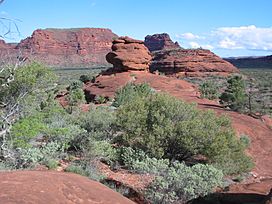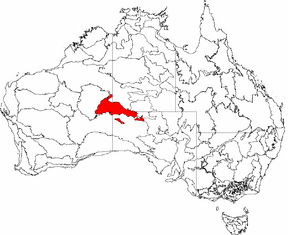Central Ranges xeric scrub facts for kids
Quick facts for kids Central Ranges xeric scrub |
|
|---|---|

|
|
| Ecology | |
| Realm | Australasian |
| Biome | deserts and xeric shrublands |
| Borders |
List
|
| Geography | |
| Area | 287,406 km2 (110,968 sq mi) |
| Country | Australia |
| States | Northern Territory, South Australia, and Western Australia |
| Conservation | |
| Conservation status | Vulnerable |
| Protected | 71,805 km² (25%) |
The Central Ranges xeric scrub is a special kind of ecoregion in Australia. An ecoregion is a large area of land or water that has its own unique set of plants, animals, and environment. This particular ecoregion is known for being a desert and dry shrubland area.
Contents
Where is the Central Ranges Xeric Scrub?
This ecoregion covers a huge area of sandy plains. It also has some rocky highland parts. Even though it's a dry place, it gets some rain in both summer and winter. The remote city of Alice Springs is located here. Many Indigenous Australian communities also live in this area. Some parts are used for raising cattle.
This region is made up of four smaller areas called IBRA bioregions. IBRA stands for Interim Biogeographic Regionalisation for Australia. These bioregions are Burt Plain, Central Ranges, Finke, and MacDonnell Ranges.
Plants of the Central Ranges
The Central Ranges ecoregion is very important for plants. It's even called a "Centre of Plant Diversity" for the Central Australian Mountain Ranges. This means many different kinds of plants grow here. The main type of plant life is thick, tough spinifex grassland. Spinifex is a spiky grass that can survive in dry conditions.
You can also find some wooded areas with trees like myall and desert oak (which is a type of Acacia tree). The MacDonnell Ranges, in particular, are home to special plants found nowhere else. One example is the cabbage palms that grow in Palm Valley within Finke Gorge National Park.
Animals of the Central Ranges
This ecoregion is home to many interesting animals and birds. Some of the birds you might see include the red-tailed black cockatoo and the spinifexbird.
For animals, there's the black-flanked rock-wallaby. A group of these wallabies lives in the MacDonnell Ranges. You might also spot the green tree frog in wetter spots.
Protecting the Central Ranges
The Central Ranges ecoregion faces some challenges. One big problem is overgrazing. This happens when too many cattle eat too much of the plants. Also, animals that were brought to Australia, like horses, donkeys, and rabbits, cause problems. They eat the plants and damage the land. These issues threaten the natural homes, or habitats, of the native plants and animals.
Special Protected Areas
To help protect this important ecoregion, several areas have been set aside as national parks. These include Finke Gorge National Park, Watarrka National Park, and West MacDonnell National Park. These parks help keep the unique environment safe for future generations.
See also
 In Spanish: Matorral xerófilo de la Cordillera Central para niños
In Spanish: Matorral xerófilo de la Cordillera Central para niños
 | Delilah Pierce |
 | Gordon Parks |
 | Augusta Savage |
 | Charles Ethan Porter |


